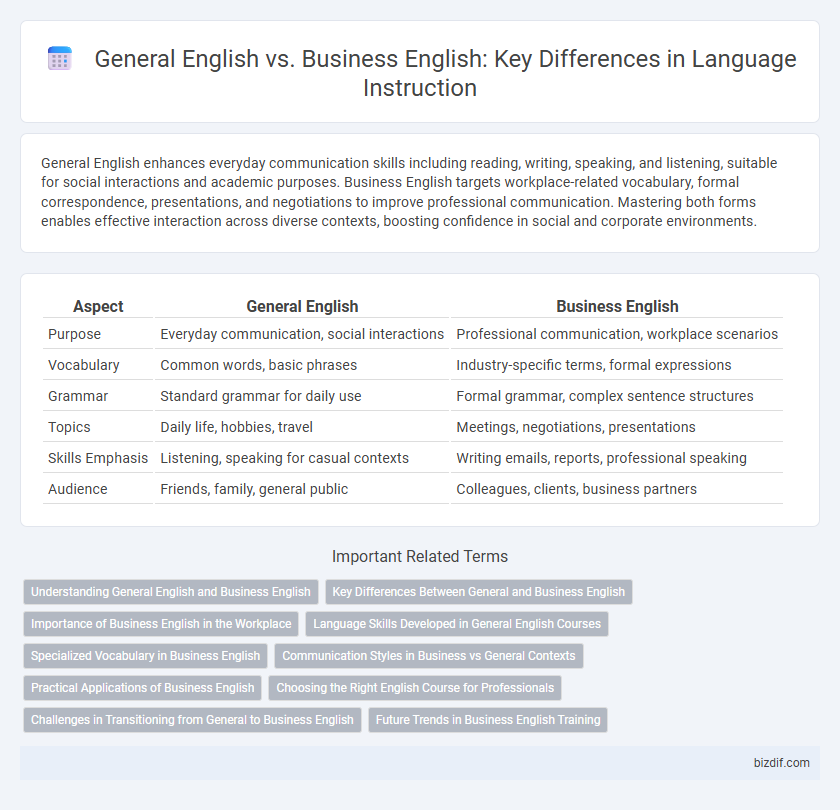General English enhances everyday communication skills including reading, writing, speaking, and listening, suitable for social interactions and academic purposes. Business English targets workplace-related vocabulary, formal correspondence, presentations, and negotiations to improve professional communication. Mastering both forms enables effective interaction across diverse contexts, boosting confidence in social and corporate environments.
Table of Comparison
| Aspect | General English | Business English |
|---|---|---|
| Purpose | Everyday communication, social interactions | Professional communication, workplace scenarios |
| Vocabulary | Common words, basic phrases | Industry-specific terms, formal expressions |
| Grammar | Standard grammar for daily use | Formal grammar, complex sentence structures |
| Topics | Daily life, hobbies, travel | Meetings, negotiations, presentations |
| Skills Emphasis | Listening, speaking for casual contexts | Writing emails, reports, professional speaking |
| Audience | Friends, family, general public | Colleagues, clients, business partners |
Understanding General English and Business English
Understanding General English involves mastering everyday vocabulary, grammar, and conversational skills essential for daily communication across diverse contexts. Business English emphasizes specialized terminology, formal writing, and presentation skills tailored to professional environments such as meetings, negotiations, and corporate correspondence. Proficiency in both forms enhances overall language competence, enabling effective interaction in social settings and business operations.
Key Differences Between General and Business English
General English focuses on everyday communication, covering broad vocabulary and common grammatical structures for daily interactions. Business English emphasizes professional terminology, formal tone, and industry-specific language tailored for meetings, presentations, and corporate correspondence. Mastery of Business English enhances effectiveness in workplace communication, negotiations, and international trade.
Importance of Business English in the Workplace
Business English is crucial for effective communication in professional environments, enhancing clarity in emails, presentations, and negotiations. Mastery of industry-specific vocabulary and formal tone boosts workplace confidence and fosters stronger client relationships. Employers value employees proficient in Business English for improved teamwork and global business interactions.
Language Skills Developed in General English Courses
General English courses primarily develop core language skills such as listening, speaking, reading, and writing applicable across everyday situations. These courses emphasize vocabulary expansion, grammatical accuracy, and conversational fluency to build a solid foundation in the English language. Practical communication skills acquired in General English programs support diverse interactions, enhancing overall language proficiency for personal and academic contexts.
Specialized Vocabulary in Business English
Business English emphasizes specialized vocabulary essential for professional communication, including terms related to finance, marketing, and corporate management. Unlike General English, which covers everyday language and broad topics, Business English focuses on industry-specific jargon and phraseology to enhance clarity and effectiveness in workplace interactions. Mastery of this specialized vocabulary improves negotiation skills, report writing, and presentations within a corporate environment.
Communication Styles in Business vs General Contexts
Business English emphasizes concise, clear communication with a focus on professionalism and efficiency, often utilizing formal vocabulary and structured formats like emails and reports. General English encourages more casual, varied expressions suitable for everyday conversations and social interactions, promoting flexibility in tone and style. Understanding these distinct communication styles enhances effectiveness in workplace interactions versus informal settings.
Practical Applications of Business English
Business English emphasizes industry-specific vocabulary, formal communication styles, and presentation skills essential for professional environments. It equips learners with practical tools for writing emails, negotiating contracts, and conducting meetings effectively within international business contexts. Mastery of Business English enhances career prospects by enabling clear, confident interaction in global markets.
Choosing the Right English Course for Professionals
Selecting the appropriate English course for professionals hinges on their specific goals; General English emphasizes broad language skills including speaking, listening, reading, and writing, suitable for everyday communication. Business English targets industry-specific vocabulary, formal communication, email etiquette, and presentation skills essential for corporate environments. Evaluating career objectives and workplace demands ensures effective language acquisition and professional growth.
Challenges in Transitioning from General to Business English
Transitioning from General English to Business English presents challenges such as mastering industry-specific vocabulary, understanding formal communication styles, and adapting to culturally diverse business environments. Learners often struggle with idiomatic expressions and jargon unique to corporate settings, affecting clarity and professionalism. Effective training programs emphasize practical scenarios and role-playing to bridge gaps between everyday conversation and business discourse.
Future Trends in Business English Training
Future trends in Business English training emphasize digital platforms integrating AI-driven personalized learning and virtual reality simulations to enhance real-world communication skills. Growing demand for cross-cultural competence and industry-specific vocabulary tailors courses to diverse global markets. Hybrid learning models combining asynchronous and synchronous sessions drive flexibility and effectiveness in professional language acquisition.
General English vs Business English Infographic

 bizdif.com
bizdif.com